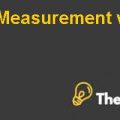Before evaluating the potential cost and benefit associated with the adoption of IFRS in US, it is very important to evaluate the US economy and institutional framework in particular respects. US economy is one of the world’s largest economy and has an increased market capitalization of public listed companies and the value of their stock traded are almost double than other economies. Further, the US firms usually rely on publicly traded external finance in order to satisfy their financing need, so it is very important that the standards adopted in the US market must fulfill the needs of the stakeholders.
Major concerns about the adoption of IFRS in US economy are related with the quality of financial reporting. US GAAP is generally of high quality as IFRS and the remaining differences between them are small. Further, there are few differences in recognition, measurement and disclosure policy between the IFRS and US GAAP along with this the IASB and FASB is continuously working towards reducing the gap between them (Luzi, 2009).
One of the major benefits of adopting IFRS in US economy is that it will improve the cross border comparability of the US reports. Major countries now use IFRS reporting, so if the US firms adopt IFRS then it will enhance the comparability with other foreign firms because it will align the common set of accounting standards that would benefit the investors in order to take decisions in the long run. Further, there are some drawbacks as well for the adoption of IFRS in US for some small organization, which may believe that the cost of implementing IFRS in accounting system may be higher than the benefits, which are expected from its implementation.
Adopting IFRS in the US economy will tend the organizations to bear short term costs. The companies would be required to suffer increased cost of changes in accounting systems and accounting processes in accordance with IFRS. Further, the companies would also be required to suffer increased cost to train their employees in the preparation of financial statements in accordance with IFRS. This might include the cost of hiring specialists and consultants, which have thorough knowledge of IFRS and which could guide the differences in accounting policies to the professional accountants (Bradshaw, 2010).
Along with one time conversion cost, there might be a recurring cost that might arise from the incompatibilities with US institutional and legal system and such issues were not easily resolved because the institutional changes take time and required substantial cost. In addition, if the US GAAP has been transformed in IFRS then it might result in a loss of innovation in standard setting because the IASB would act as a monopoly in standard setting and it would also lack the competition with other standard setting boards, hence compromising the overall quality of the standards (Luzi, 2009).
Multinational countries that have a possession around the world could also benefit from the adoption of IFRS in US because it would lead the whole group to use a single set of standards for financial reporting around the world. Further, the foreign subsidiaries were required to comply with their domestic standards and later on it was required to translate the results in US GAAP reporting, which might increase the translation cost for multinational companies, so if IFRS would be adopted in US then it would substantially reduce the translation cost for the group and it would also eliminate the effects of changes in accounting policies and accounting estimates.
Further, the adoption of IFRS in the US economy will improve the liquidity of capital market because it provides better information on corporate performance to the investors; which will enhance the investor’s confidence and provide them an opportunity to invest in worthwhile opportunities. Further, it will also facilitate the organizations to report a lower cost of capital, which will enhance the return on potential projects and will make the projects financially viable (Bradshaw, 2010).
One of the major problem that may be faced by US for the adoption of IFRS in US is that it may not promote the consistency in the long run because there may be differences in financial reporting due to changes in economic conditions, national laws and objectives. Further, if IFRS is implemented in the US then the companies will be required to incur substantial time and resources to convert the IFRS completely in the accounting system and processes (Luzi, 2009)......................................
This is just a sample partial case solution. Please place the order on the website to order your own originally done case solution.













